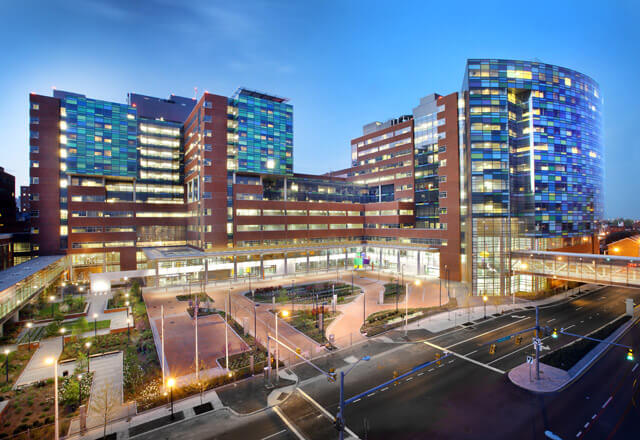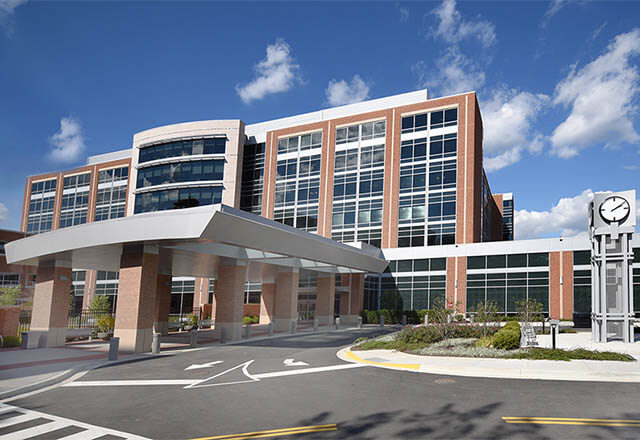Selecting the best treatment for prostate cancer requires the advanced expertise of experienced specialists. Johns Hopkins’ Prostate Cancer Multidisciplinary Clinic offers patients the guidance of top radiation oncologists, surgeons, cancer drug experts and pathologists — focused on researching the latest approaches to prostate cancer and employing the most sophisticated diagnostic tools and state-of-the-art treatments.
Schedule an Appointment
Care for Men Newly Diagnosed with Prostate Cancer
Each patient’s case is reviewed by the multidisciplinary expert team to create the most appropriate, personalized treatment plan, including access to clinical trials. Patients meet with their physicians to discuss options, and patient support providers such as nutritionists, genetic testing experts, social workers and nurse navigators facilitate the treatment journey.
-
Prostate Cancer Experts
Our clinics provide multidisciplinary teams of prostate cancer experts to treat your condition.
-
Treatment
Get the most advanced treatment from our team of experts, working together to create the right plan just for you.
-
Effects Following Treatment
Discover how prostate cancer treatment can affect urinary and bowel function, and explore effective ways to manage these common side effects.
-
Locations
Johns Hopkins offers clinics in Baltimore and Washington, D.C.
What you need before your visit
Speak to your doctor about transferring the following so your records will arrive at least 10 days before your appointment:
- All medical records about your diagnosis, including pathology slides
- CD of all imaging tests, including PSMA, bone scan, and/or CT/MRI of abdomen and pelvis if PSA level is greater than 20, or Gleason score is 8, 9 or 10
Please provide your insurance information
Your visit will begin with a physical examination and a review of your medical history, records and scans. Your appointment may also include additional tests and scans.
While you are meeting with a specialist chosen specifically to address your needs, our expert panel will conduct an extensive review of your case. You may request to see any of physicians on the expert team during your evaluation.
Treatment Plans Are Available
The Prostate Cancer Multidisciplinary Clinic offers treatment plans to men who have been diagnosed with the following:
- Intermediate- or high-risk prostate cancer (Gleason score of 3+4 or higher), untreated
- Locally advanced (lymph node positive) or metastatic (up to five metastases) prostate cancer, untreated
- Recurrent prostate cancer with rising PSA level after local therapy (such as prostatectomy, radiation)
Prostate cancer overview
-
Some prostate cancers are very slow-growing and never need treatment. Others are extremely aggressive and can be fatal within a matter of months after they are diagnosed. Of critical importance is knowing which kind of cancer it is, and the physicians at the Prostate Cancer Multidisciplinary Clinic have the expert experience and most advanced techniques to make that determination.
Learn More -
In general, the earlier prostate cancer is caught, the more likely it is for a man to get successful treatment and remain disease-free. The overall prognosis for prostate cancer is among the best of all cancers.
It’s important to keep in mind that survival rates and likelihood of recurrence are based on averages and won’t necessarily reflect any individual patient outcome. The prognosis for prostate cancer depends on many factors. Doctors at the Prostate Cancer Multidisciplinary Clinic will offer insight and advice based on your specific case.
-
- About 299,000 men in the U.S. will get prostate cancer in 2024. It is the most common cancer in men, other than skin cancer. Nearly three out of four men with prostate cancer will be age 65 or older.
- About 80 percent of prostate cancers are diagnosed at a localized stage, which means that the cancer hasn’t spread outside of the prostate.
- Black men and men with a family history of the disease are at higher risk of developing prostate cancer. A man with a father or brother who had prostate cancer is twice as likely to develop the disease. Black men are also more than twice as likely to die from prostate cancer.
- Prostate cancer is the second leading cause of cancer death in men in the U.S. after lung cancer. About 35,250 men in the U.S. will die of prostate cancer in 2024.
Source: American Cancer Society
-
Fertility After Prostate Cancer Treatment
It is nearly impossible for a man to retain his ability to father children through sexual intercourse after surgery or radiation.During prostatectomy, both the prostate and the nearby seminal vesicles are removed, and a vasectomy is performed. Seminal vesicles and the prostate produce semen that carries the sperm down the urethra and out of the penis during ejaculation. The loss of the organs that produce semen following surgery, plus the vasectomy, makes ejaculation impossible, so the sperm cannot physically leave the body. Radiation therapy nearly always impairs fertility. Radiated prostate cells and seminal vesicles tend to produce semen that cannot transport the sperm well. Sperm can also be damaged, though this occurs far less frequently with more accurate dose planning.
Post-Treatment Fertility Options
For men who wish to father children after treatment for prostate cancer, the best chance for fertility is sperm banking. Semen containing sperm is frozen in liquid nitrogen. After thawing, up to 50% of sperm will regenerate and can be used for artificial insemination.Extracting sperm directly from the testicles might be another option. After harvesting sperm from testicular tissue, a single microscopic sperm is injected into a single microscopic egg. If an embryo forms, it is implanted into the woman’s uterine wall and allowed to grow.The success rates for the two procedures combined—sperm extraction followed by injection of the sperm into the egg—is less than 50%.
-
Urinary dysfunction is a common side effect of prostate cancer treatments such as prostatectomy, external beam radiotherapy, and brachytherapy. Symptoms can include incontinence, increased urinary frequency, urgency, and irritative urination, with varying degrees of severity and recovery timelines depending on the treatment type. Bowel dysfunction, including diarrhea, fecal incontinence, and rectal bleeding, may also occur following prostate cancer treatments.
Locations
-
The Johns Hopkins Hospital
The Harry and Jeanette Weinberg Building
401 North Broadway
Baltimore, MD 21231
-
Sibley Memorial Hospital
Johns Hopkins Radiation Oncology
5255 Loughboro Road, NW
Washington, DC 20016

